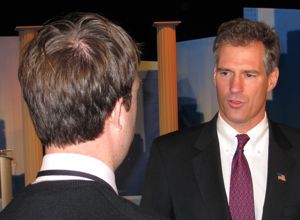(Note: This item has been corrected. See below.) If Attorney General Martha Coakley thinks David Portnoy broke the law, then she should charge him. If not, then she should leave him alone. What she shouldn’t do is send state troopers to his house to intimidate him into removing nude photos of Tom Brady’s 2-year-old son from his sleazy website, Barstool Sports.
A number of legal experts, including Coakley herself, have concluded that Portnoy did not violate child-pornography laws because there was no “lascivious intent,” according to the Boston Globe. Indeed, Portnoy’s crude commentary about the size of the boy’s genitals may actually have helped him, since he demonstrated that he is a moron rather than a pervert.
But Coakley, having come to the conclusion that Portnoy broke no law, had no business dispatching police officers to his home to tell him what content was appropriate and inappropriate for his website. Portnoy said the officers were polite, but as First Amendment lawyer Jonathan Albano tells the Globe, “There’s an inherent element of coercion when civilians are faced with police in uniforms.” I’m glad Portnoy finally removed the photos, but the principle is that law-enforcement officials shouldn’t tell people that it would be a good idea if they stopped engaging in legally permissible conduct.
That’s not to say Portnoy didn’t show incredibly poor judgment. The Boston Herald reports that — yes — Howard Stern is among those taking Portnoy to task, telling him during an appearance on his radio show, “I have three daughters and I gotta tell you, Dave, I would never post a picture of a child and comment on their genitals, and I’m known for outrageous commentary.”
There would have been no free-speech issue if, instead of state troopers, Portnoy had opened his door and found Tom Brady and a couple of Patriots linemen standing on his front porch. It would have been a lot more satisfying, too.
Correction: It has come to my attention that I misunderstood the timeline. At the time that state troopers visited Portnoy’s house, Coakley’s office was still investigating, and had not yet decided whether to bring criminal charges against him. The troopers did ask that Portnoy remove the photos, and he voluntarily did so. It was only after that that Coakley decided no crime had been committed.
Photo (cc) 2009 by Dan Kennedy. Some rights reserved.





 State officials want you to know that there is absolutely no reason for you to worry about the
State officials want you to know that there is absolutely no reason for you to worry about the 
